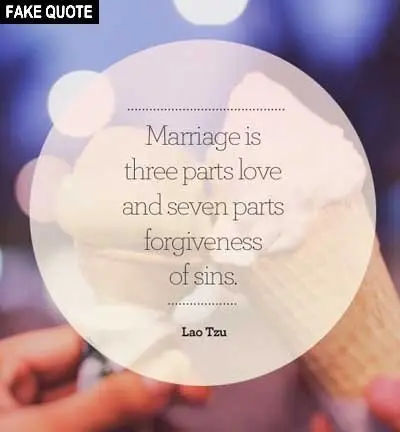Fake Lao Tzu Quote
"Marriage is three parts love..."

This is NOT a quote from Tao Te Ching:
"Marriage is three parts love and seven parts forgiveness of sins."
The Book
The Taoism of Lao Tzu Explained. The great Taoist philosophy classic by Lao Tzu translated, and each of the 81 chapters extensively commented. Click the image to see the book at Amazon (paid link).
More about the book here.
|
Lao Tzu did not write about marriage and marital love at all. Nor would he be comfortable with the word "sin," which is something closely linked to Christianity. Still, this quote is frequently accredited to him — I fail to see why.
It is, in fact, from a play called The New York Idea by Langdon Elwyn Mitchell (1862-1935). It premiered 1906, and was published in a book 1908. John, one of the characters of the play, speaks bitterly about his former wife (pages 62-63):
Well, she was an heiress, an American heiress — and she'd been taught to think marriage meant burnt almonds and moonshine and a yacht and three automobiles, and she thought — I don't know what she thought, but I tell you, Mrs. Phillimore, marriage is three parts love and seven parts forgiveness of sins.
|
90 of the most spread false Lao Tzu quotes, why they are false and where they are really from. Book by Stefan Stenudd. Click the image to see the book at Amazon (paid link).
More about the book here.
|
This comment about love and sins has been quoted in many books through the years, ascribing it to its proper author. The first book to ascribe it to Lao Tzu, as far as I have found, is Making a Short Speech or Toast from 2016, by Jackie Arnold. I have not been able to check its first edition from 2007, but I assume the quote was there as well.
The earliest web page I have found accrediting the quote to Lao Tzu is in a comment from February 25, 2011, on a blog post on temptation and sin. It appeared on Facebook for the first time the same year, ascribing it correctly to Mitchell. The following year, on April 26, 2012, the first Facebook post ascribing it to Lao Tzu appeared.
I am not convinced that ascribing the quote to Lao Tzu originated with Arnold's book, but I have not found any earlier source to it. Why anyone would imagine this to be a genuine Lao Tzu quote remains a mystery.
Stefan Stenudd
September 18, 2020.
There are many more fake Lao Tzu quotes examined on this website.
Click the header to see a list of them.
Click the header to read a "fake" interview with Stefan Stenudd, the author of
Fake Lao Tzu Quotes.
My Taoism Books
Click the image to see the book at Amazon (paid link).
The Taoism of Lao Tzu Explained. The great Taoist philosophy classic by Lao Tzu translated, and each of the 81 chapters extensively commented.
More about the book here.
The Ancient Wisdom of the Tao Te Ching by Lao Tzu. 389 quotes from the foremost Taoist classic, divided into 51 prominent topics. Click the image to see the book at Amazon (paid link).
More about the book here.
Erroneous Tao Te Ching Citations Examined. 90 of the most spread false Lao Tzu quotes, why they are false and where they are really from. Click the image to see the book at Amazon (paid link).
More about the book here.
|
My Other Websites:
The 64 hexagrams of the Chinese classic
I Ching and what they mean in divination. Try it online for free.
The ancient Chinese life energy
qi (
chi) explained, with simple instructions on how to exercise it.
The many ancient and modern life force beliefs all over the world explained and compared.
Other Books by Stefan Stenudd
Click the image to see the book at Amazon (paid link).
The Greek philosophers and what they thought about cosmology, myth, and the gods.
The life energy
qi (also
chi or
ki) explained, with exercises on how to awaken, increase and use it.
Basic concepts of the peaceful martial art. Aikido principles, philosophy, and fundamental ideas.
Qi, prana, spirit, ruach, pneuma, and many other life forces around the world explained and compared.
Jungian theories on myth and religion examined, from Carl G. Jung to Jordan B. Peterson.
About me
I'm a Swedish author and aikido instructor. In addition to fiction, I've written books about Taoism and other East Asian traditions. I'm also an historian of ideas, researching ancient thought and mythology. Click the image to get to my personal website.

 Tao Te Ching
Tao Te Ching Now it's a book, too!
Now it's a book, too! Tao Quotes
Tao Quotes Cosmos of the Ancients
Cosmos of the Ancients Qi — Increase Your Life Energy
Qi — Increase Your Life Energy Aikido Principles
Aikido Principles Life Energy Encyclopedia
Life Energy Encyclopedia Archetypes of Mythology
Archetypes of Mythology Stefan Stenudd
Stefan Stenudd